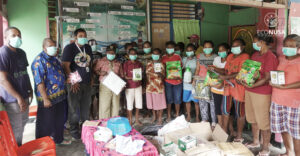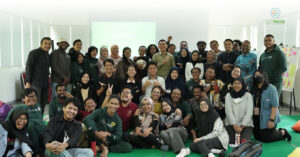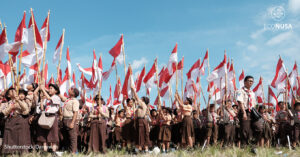
As a discovery in science, plastic was originally created to facilitate human life. However, who would have thought that plastic would now be a common enemy of humankind and the environment in which all creatures in the world live.
Based on data collected by a team of researchers at the University of California, Santa Barbara, University of Georgia, and the Marine Education Association, the United States, states that more than 9 billion tons of plastic have been produced since 1950. Of this amount, only 9 percent has been successfully recycled.
Plastic is also very influential in changing human civilization. Culture has shifted with the presence of plastic, one of which is human behavior in shopping in traditional and modern markets.
In the past, people tended to wear environmentally friendly bags made from leaves and rattan that are environmentally friendly. The presence of plastic crushes these bags, because each trader provides plastic shopping bags as containers for items purchased at their place. Unfortunately, from all plastic shopping bags it will tend to become garbage which then burdens the environment.
Realizing this, various initiatives have been tried by the community through the community or individually as a preventive measure. The current lifestyle of many people who use shopping bags over and over.
The most influential of course is the Government’s policy at the National and Regional level which limits the provision of plastic shopping bags in retail as well as in traditional markets. However, so far only 3 Regional Governments namely Banjarmasin, Balikpapan and Bogor have dared to push this progressive step in a formal policy.
Bogor, as a city that has just announced that it will ban the provision of plastic shopping bags in modern retailers from December, said that this was done to reduce the growing pile of garbage in Bogor.
So far, garbage piles per day in Bogor have reached 600 tons of garbage, 13 percent of which is plastic. “We are totally upstream, including encouraging people to choose and sort their waste, grow waste banks, limit plastic and education on the use of tumblers, the result is reduced by 50 to 70 tons of garbage per day,” said Bogor Mayor Bima Arya Sugiarto in a discussion titled Proud Movement without Plastics by Returning to Traditional #BanggaTanpaPlastik #KbackKeTradition held at the PD Jaya Tanah Abang Market Block B, Jakarta, Tuesday (02/10/2018).
By restricting plastic bags in retail, Bima said he also tried to further examine the replacement goods. One of them is environmentally friendly plastic made from tapioca fiber which is organic and easily biodegradable in the environment.
“We are now trying to prepare environmentally friendly bags and businesses to prepare their substitutes,” added Bima.
Meanwhile, Balikpapan, which has been implementing the policy since the Mayor’s Regulation was issued last April, has received support from various parties. One of them is the Balikpapan Regional House of Representatives which proposes that the ban on plastics be regulated in stronger regulations, namely Regional Regulations.
The Head of the Balikpapan Environment Agency, Suryanto, who was present at the occasion, stated that with the proposed Regional Regulation, the plastic ban was planned to be expanded. Not only limited to plastic shopping bags, but also on other plastic packaging.
“One of the restrictions that may be issued is in the tourism area there should not be food with plastic packaging to enter,” said Suryanto.
On the same occasion, Head of DKI Jakarta Environment Agency Isnawa Adji said that although there was no specific policy related to reducing plastic shopping bags in the National Capital, law enforcement was carried out for those who littered. This is commonly seen on Motor Vehicle Free Day in DKI Jakarta.
“At that time, do not expect that there are people who can come out, our officers will act immediately. If anyone passes, they will be lucky at that time, “he explained.
In addition to this momentum, several times Isnawa and the team also caught sight of rogue elements who littered the environment. “In total, in 2016 we succeeded in collecting fines of littering up to Rp.116 million,” he explained.
On different occasions, environmental activist Bustar Maitar appreciated the initiatives that surfaced related to the reduction of waste, especially plastic waste. He stated that plastic waste must be reduced so that it does not run into the ocean. Because, plastic is a pollutant that is difficult to decompose and vulnerable to fish food and damage marine ecosystems such as coral reefs.
Quoting BPS & INAPLAS data, plastic waste in Indonesia reaches 64 million tons / year of which 3.2 million tons is plastic waste. Meanwhile, 10 billion pieces of plastic bags are thrown into the environment per year totaling 85,000 tons.
“If we see our sea is blue, but the real problem is in the sea. Plastic waste and its impact on the marine ecosystem will continue. So with the encouragement from the government and the awareness of each individual to reduce plastic consumption will also have an impact on the health of our oceans. Because the sea is the future of the nation, “added Bustar who is also the Chairperson of the EcoNusa Foundation.
“The community must be able to change their behavior to reduce the use of plastics, but greater responsibility lies with producers who use plastic in their products and those who make plastic themselves,” Bustar said.









